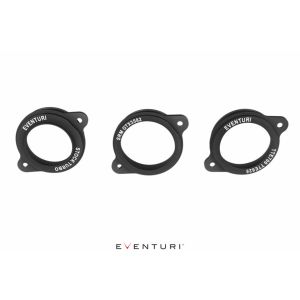- Ordered before 16:00 shipped the same day.
- Displeased? You always have 14 days to return your purchase.
- Need professional advice?start a live chat or send an email to info@fullcartuning.com
| SKU | 93484 |
|---|---|
| Brand | Eventuri |
| Certificate | No Certificate |
| Manufacturer Code | EVE-TRB8V8S-LHD-NIL |
| Mounting Hardware | Yes |
| Quantity | 1 Piece |
| Car Brand Name | Audi |
| Car Model Name | RS3,TTRS |
| Material | Carbon |
| Universal | No |
| Version | Gen 2 |
| Technical Details | NOTE: To mount this Inlet you will need article number 93486 |
Fitment for RS3 8V Gen 2 and TTRS 8S Left and Right hand drive. Finished in raw carbon – no clearcoat.
Presenting a World First – an all carbon RS3/TTRS turbo inlet elbow. We have invested months of intense R&D in developing an inlet which leaves no room for compromise. VOLUME – FLOW QUALITY – TEMPERATURE are the 3 main design criteria which we sought to meet.
1) VOLUME : Inlet Diameters – Eventuri 103mm : Stock 72mm. Outlet Diameters – Eventuri 74mm : Stock 56.4mm. Clearly with significantly larger internal diameter sizes, the Eventuri elbow encapsulates a much larger internal volume which de-restricts the flow path to the turbo.
2) FLOW QUALITY : Having just a large internal volume is no good unless the flow path also allows for smooth airflow to the turbo. By using high temperature Prepreg Carbon Fiber we have managed to achieve a smooth internal surface. In contrast, the stock and other aftermarket elbows are all made from cast aluminium which end up with a rough internal surface. This coupled with the smooth curvature of the elbow results in a flow path which minimises turbulence.
3) TEMPERATURE : The final criteria was to minimise the conduction of heat into the airflow. The stock inlet is directly connected to the turbo and so immediately conducts heat as the turbo spools. Our system uses a machined flange which connects to the turbo and then a silicon coupler with an integrated thermal spacer to keep the carbon elbow from having direct contact with the turbo. This barrier coupled with the low through-thickness thermal conductivity of carbon fiber results in less heat being transferred to the airflow.






